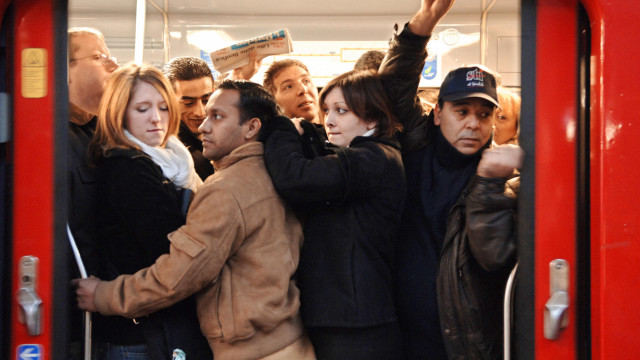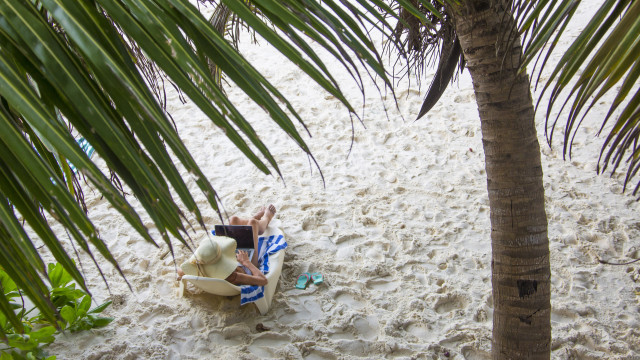






























See Also
See Again
American customs that are considered offensive in other countries
- Even with the best of intentions, Americans occasionally reinforce negative views of the US by not paying attention to their actions, words, or gestures that are seen as offensive in other countries. If you're set to travel to another country, you'll definitely want to take a look through this list of customs that are considered rude and offensive in other places around the world.
© Shutterstock
0 / 31 Fotos
Touching - Touching and hugging other people in China, Korea, and the Middle East is offensive.
© iStock
1 / 31 Fotos
Sitting in the back of a cab - In Australia, New Zealand, and the Netherlands, riding shotgun is the norm as it is seen as a matter of egalitarianism.
© iStock
2 / 31 Fotos
Peace sign - In the UK, the peace sign is equivalent to flipping someone off.
© iStock
3 / 31 Fotos
Opening a gift in front of the gift-giver - In Asian countries, such as China and India, opening a gift immediately upon receiving it is seen as being greedy.
© iStock
4 / 31 Fotos
Referring to the US as just "America" - If you want to talk about your country while in South America, call it the United States and not "America." A seemingly innocent habit is seen as insulting to South Americans who also live in America.
© iStock
5 / 31 Fotos
Laughing open-mouthed - In Japan, laughing while exposing your teeth is considered extremely rude.
© iStock
6 / 31 Fotos
Complaining about service - "The customer is always right" does not exist in Europe. Don't expect to be heard if you complain about bad service.
© iStock
7 / 31 Fotos
The "A-OK" sign - In certain countries this hand gesture is crude and offensive, and in places like Turkey, it is specifically offensive to homosexuals.
© iStock
8 / 31 Fotos
Patriotism - In many other countries and cultures, being overly nationalistic and proud of one's own country brings negative and still-raw reminders of fascism.
© iStock
9 / 31 Fotos
Eating in public - In Japan, eating while walking or in places that are not restaurants is considered both weird and impolite.
© iStock
10 / 31 Fotos
Wearing shoes in the house - In Caribbean and Asian cultures in particular, not removing shoes when entering the home is a huge sign of disrespect.
© iStock
11 / 31 Fotos
Thumbs up - If you give a thumbs up in the Middle East, Latin America, and western Africa, it is the same as showing them your middle finger.
© iStock
12 / 31 Fotos
Blowing your nose - It is considered rude and even repulsive in countries including China, France, Japan, and Saudi Arabia to blow your nose in public.
© iStock
13 / 31 Fotos
Jaywalking - In northern Europe, jaywalking is illegal, and the law is also strictly adhered to. Even when there are no cars coming, people wait for the crosswalk signal.
© iStock
14 / 31 Fotos
Talking about mental health - Americans tend to speak freely about their mental health care, and seeing a therapist is becoming less and less stigmatized. However if you go to the UK, talking about this part of your life is considered a huge overshare and makes people very uncomfortable.
© iStock
15 / 31 Fotos
Revealing the soles of the feet - In Arab, Buddhist, Muslim, and Hindu countries, showing the soles of your feet is a sign of disrespect as they are seen as dirty.
© iStock
16 / 31 Fotos
Refusing food - In Lebanon don't even think about refusing an offering of food, as you will be deeply insulting the person and the culture.
© iStock
17 / 31 Fotos
Altering food - In southern Europe, seasoning your food and dressing it in condiments is an insult to the chef. You are basically telling them that they did not prepare it well enough.
© iStock
18 / 31 Fotos
Crossing fingers - Americans cross their fingers as a way of saying "I hope so!" or for good luck. However in Vietnam, crossed fingers is a crass gesture for a female genitalia.
© iStock
19 / 31 Fotos
Showing up on time - In Latin American cultures, showing up on time is the equivalent of showing up an hour early in the US. No one likes to have to entertain a guest who arrives early when they're still preparing for their dinner party.
© iStock
20 / 31 Fotos
Asking what someone does for a living - Asking this question in the Netherlands is the same as asking how much money they make, and is seen as a classist question.
© iStock
21 / 31 Fotos
Fashionably late
- In Germany, there is no concept of being fashionably late. If you are expected to meet someone at a certain time, you must arrive early or right on the dot.
© Shutterstock
22 / 31 Fotos
Not offering a beverage - In other countries, it is expected to offer visitors a drink when they enter your home, including anyone from a friend to the repairman.
© iStock
23 / 31 Fotos
Excessive use of superlatives - Americans tend to describe the most innocuous things as "amazing" or "the best ever," giving others the impression that we are fake or dishonest.
© Shutterstock
24 / 31 Fotos
One hand in the pocket - In certain Asian countries, this position is considered very arrogant.
© iStock
25 / 31 Fotos
Bringing someone the bill before they ask for it - In Europe, a waiter or waitress who brings the bill before the customer requests it is telling them to get out of the restaurant or pub.
© iStock
26 / 31 Fotos
Eating everything on your plate - The "Clean Plate Club" does not exist in countries including China, Russia, and Thailand, where clearing your plate is seen as a sign that you were not served enough to eat and are still hungry.
© iStock
27 / 31 Fotos
A firm handshake - In the Philippines, keep your grip loose and casual. A firm handshake is a sign of dominance, whereas a loose one is a sign of respect.
© iStock
28 / 31 Fotos
Using your left hand - In Africa, India, and Sri Lanka where the left hand replaces toilet paper, using it for anything else is extremely offensive.
© iStock
29 / 31 Fotos
Wearing sweatpants with flip-flops
- Certain outfits, including sweatpants with flip-flops, baggy clothes, and baseball caps, are a no-go in Japan and certain European countries where this attire is seen as disrespectful and sloppy. See also: Places Americans don’t visit—but definitely should
© Shutterstock
30 / 31 Fotos
American customs that are considered offensive in other countries
- Even with the best of intentions, Americans occasionally reinforce negative views of the US by not paying attention to their actions, words, or gestures that are seen as offensive in other countries. If you're set to travel to another country, you'll definitely want to take a look through this list of customs that are considered rude and offensive in other places around the world.
© Shutterstock
0 / 31 Fotos
Touching - Touching and hugging other people in China, Korea, and the Middle East is offensive.
© iStock
1 / 31 Fotos
Sitting in the back of a cab - In Australia, New Zealand, and the Netherlands, riding shotgun is the norm as it is seen as a matter of egalitarianism.
© iStock
2 / 31 Fotos
Peace sign - In the UK, the peace sign is equivalent to flipping someone off.
© iStock
3 / 31 Fotos
Opening a gift in front of the gift-giver - In Asian countries, such as China and India, opening a gift immediately upon receiving it is seen as being greedy.
© iStock
4 / 31 Fotos
Referring to the US as just "America" - If you want to talk about your country while in South America, call it the United States and not "America." A seemingly innocent habit is seen as insulting to South Americans who also live in America.
© iStock
5 / 31 Fotos
Laughing open-mouthed - In Japan, laughing while exposing your teeth is considered extremely rude.
© iStock
6 / 31 Fotos
Complaining about service - "The customer is always right" does not exist in Europe. Don't expect to be heard if you complain about bad service.
© iStock
7 / 31 Fotos
The "A-OK" sign - In certain countries this hand gesture is crude and offensive, and in places like Turkey, it is specifically offensive to homosexuals.
© iStock
8 / 31 Fotos
Patriotism - In many other countries and cultures, being overly nationalistic and proud of one's own country brings negative and still-raw reminders of fascism.
© iStock
9 / 31 Fotos
Eating in public - In Japan, eating while walking or in places that are not restaurants is considered both weird and impolite.
© iStock
10 / 31 Fotos
Wearing shoes in the house - In Caribbean and Asian cultures in particular, not removing shoes when entering the home is a huge sign of disrespect.
© iStock
11 / 31 Fotos
Thumbs up - If you give a thumbs up in the Middle East, Latin America, and western Africa, it is the same as showing them your middle finger.
© iStock
12 / 31 Fotos
Blowing your nose - It is considered rude and even repulsive in countries including China, France, Japan, and Saudi Arabia to blow your nose in public.
© iStock
13 / 31 Fotos
Jaywalking - In northern Europe, jaywalking is illegal, and the law is also strictly adhered to. Even when there are no cars coming, people wait for the crosswalk signal.
© iStock
14 / 31 Fotos
Talking about mental health - Americans tend to speak freely about their mental health care, and seeing a therapist is becoming less and less stigmatized. However if you go to the UK, talking about this part of your life is considered a huge overshare and makes people very uncomfortable.
© iStock
15 / 31 Fotos
Revealing the soles of the feet - In Arab, Buddhist, Muslim, and Hindu countries, showing the soles of your feet is a sign of disrespect as they are seen as dirty.
© iStock
16 / 31 Fotos
Refusing food - In Lebanon don't even think about refusing an offering of food, as you will be deeply insulting the person and the culture.
© iStock
17 / 31 Fotos
Altering food - In southern Europe, seasoning your food and dressing it in condiments is an insult to the chef. You are basically telling them that they did not prepare it well enough.
© iStock
18 / 31 Fotos
Crossing fingers - Americans cross their fingers as a way of saying "I hope so!" or for good luck. However in Vietnam, crossed fingers is a crass gesture for a female genitalia.
© iStock
19 / 31 Fotos
Showing up on time - In Latin American cultures, showing up on time is the equivalent of showing up an hour early in the US. No one likes to have to entertain a guest who arrives early when they're still preparing for their dinner party.
© iStock
20 / 31 Fotos
Asking what someone does for a living - Asking this question in the Netherlands is the same as asking how much money they make, and is seen as a classist question.
© iStock
21 / 31 Fotos
Fashionably late
- In Germany, there is no concept of being fashionably late. If you are expected to meet someone at a certain time, you must arrive early or right on the dot.
© Shutterstock
22 / 31 Fotos
Not offering a beverage - In other countries, it is expected to offer visitors a drink when they enter your home, including anyone from a friend to the repairman.
© iStock
23 / 31 Fotos
Excessive use of superlatives - Americans tend to describe the most innocuous things as "amazing" or "the best ever," giving others the impression that we are fake or dishonest.
© Shutterstock
24 / 31 Fotos
One hand in the pocket - In certain Asian countries, this position is considered very arrogant.
© iStock
25 / 31 Fotos
Bringing someone the bill before they ask for it - In Europe, a waiter or waitress who brings the bill before the customer requests it is telling them to get out of the restaurant or pub.
© iStock
26 / 31 Fotos
Eating everything on your plate - The "Clean Plate Club" does not exist in countries including China, Russia, and Thailand, where clearing your plate is seen as a sign that you were not served enough to eat and are still hungry.
© iStock
27 / 31 Fotos
A firm handshake - In the Philippines, keep your grip loose and casual. A firm handshake is a sign of dominance, whereas a loose one is a sign of respect.
© iStock
28 / 31 Fotos
Using your left hand - In Africa, India, and Sri Lanka where the left hand replaces toilet paper, using it for anything else is extremely offensive.
© iStock
29 / 31 Fotos
Wearing sweatpants with flip-flops
- Certain outfits, including sweatpants with flip-flops, baggy clothes, and baseball caps, are a no-go in Japan and certain European countries where this attire is seen as disrespectful and sloppy. See also: Places Americans don’t visit—but definitely should
© Shutterstock
30 / 31 Fotos
American customs that are considered offensive in other countries
Not all customs and norms are universal
© Shutterstock
Even with the best of intentions, Americans
occasionally reinforce negative views of the
US by not paying attention to their actions, words, or gestures that are seen as offensive in other countries. If you're set to travel to another country, you'll definitely want to take a look through this list of customs that are considered rude and offensive in other places around the world.
RECOMMENDED FOR YOU




































MOST READ
- Last Hour
- Last Day
- Last Week








